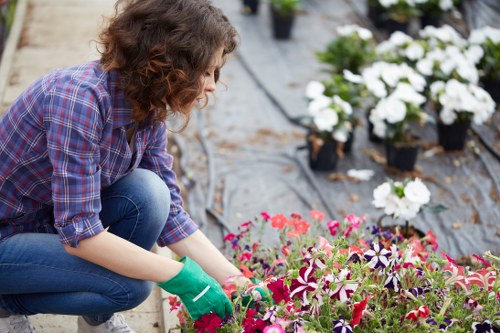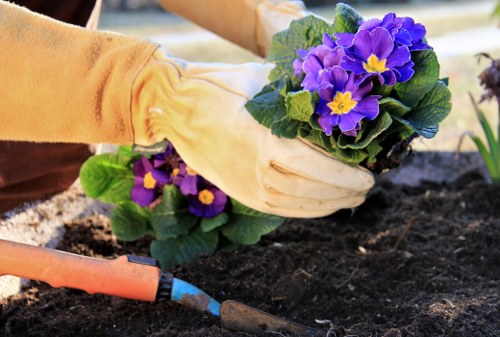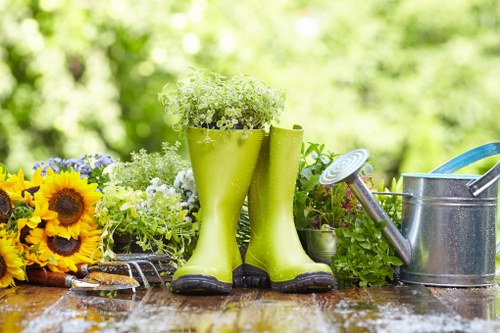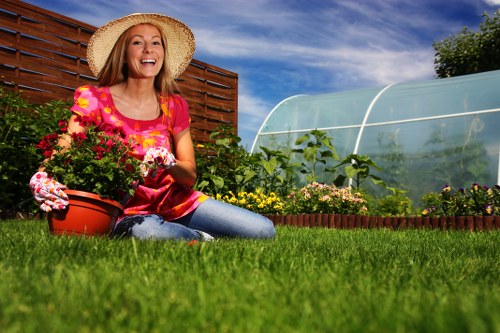Comprehensive Guide to Garden Maintenance in Shepherds Bush
Introduction to Garden Maintenance

Gardening is both an art and a science, requiring dedication and knowledge to transform a simple outdoor space into a vibrant and thriving garden. In Shepherds Bush, where urban living meets lush greenery, maintaining a garden poses unique challenges and opportunities. This article delves into the essentials of garden maintenance in Shepherds Bush, offering insights and tips tailored to the local climate and community needs.
Whether you’re a seasoned gardener or a novice, understanding the specific requirements of your garden can enhance its beauty and functionality. Shepherds Bush boasts a diverse range of garden styles, from small residential plots to expansive communal spaces, each with its own maintenance needs.
Effective garden maintenance not only enhances the aesthetic appeal of your property but also contributes to environmental sustainability by promoting biodiversity and reducing urban heat islands.
Importance of Regular Garden Maintenance

Regular garden maintenance is crucial for several reasons. It ensures the health and longevity of plants, prevents the spread of pests and diseases, and maintains the overall structure and safety of garden features. Additionally, a well-maintained garden can increase property value and provide a peaceful retreat from the hustle and bustle of Shepherds Bush.
Neglecting garden maintenance can lead to overgrown plants, which may obstruct pathways, reduce light exposure to other plants, and create an unkempt appearance. Moreover, unmanaged gardens can become breeding grounds for pests, attracting unwanted wildlife and potentially causing damage to plants.
By investing time and resources into regular maintenance, gardeners can enjoy a lush and healthy garden year-round, fostering a harmonious relationship with nature.
Seasonal Garden Care

Understanding the seasonal changes in Shepherds Bush is essential for effective garden maintenance. Each season brings its own set of challenges and tasks that help keep your garden in optimal condition.
Spring Maintenance
Spring is a time of renewal, making it the perfect season to prepare your garden for growth. Begin by clearing away any debris that accumulated over the winter months. Prune dead branches, and apply a fresh layer of mulch to retain moisture and suppress weeds.
Summer Care
During the summer, focus on watering and fertilizing your plants to ensure they receive adequate nutrients. Regularly check for signs of pests and diseases, and take prompt action to address any issues. Pruning and deadheading flowers can encourage continuous blooming.
Autumn Maintenance
Autumn is ideal for planting new shrubs and perennials, as the cooler weather allows for better root establishment. Rake fallen leaves and compost them to create nutrient-rich soil for the next planting season.
Choosing the Right Plants for Shepherds Bush

Selecting appropriate plants is fundamental to successful garden maintenance. In Shepherds Bush, considerations such as soil type, sunlight exposure, and local climate play a significant role in determining which plants will thrive.
Opt for native and drought-tolerant species that are well-adapted to the local environment. These plants not only require less maintenance but also support local biodiversity by attracting pollinators and beneficial insects.
Popular Plant Varieties
- Lavender: Known for its fragrant blooms and resilience.
- Hostas: Ideal for shaded areas with their lush foliage.
- Roses: A classic choice that adds elegance and color.
- Ornamental Grasses: Provide texture and movement in the garden.
By choosing the right plants, gardeners can create a sustainable and visually appealing garden that requires minimal upkeep.
Professional Garden Services in Shepherds Bush

For those who prefer to leave garden maintenance to the experts, numerous professional garden services operate in Shepherds Bush. These services offer a wide range of solutions, from regular upkeep to complete garden makeovers.
Engaging professional gardeners can save time and ensure that your garden receives the specialized care it needs. They are equipped with the knowledge and tools to handle complex maintenance tasks, such as soil analysis, pest control, and landscape design.
Benefits of Hiring Professionals
- Expertise: Professionals possess in-depth knowledge of plant care and garden management.
- Time-Saving: Hiring experts frees up your time for other activities.
- Quality Results: Professionals ensure that maintenance tasks are performed to the highest standards.
- Customized Services: Tailored maintenance plans to suit your garden’s specific needs.
Consider reaching out to local garden services to discuss your maintenance requirements and explore the available options.
DIY Garden Maintenance Tips

For gardening enthusiasts who enjoy hands-on care, DIY garden maintenance can be both rewarding and cost-effective. Implementing a few key strategies can make a significant difference in the health and appearance of your garden.
Regular Weeding and Pruning
Regularly removing weeds prevents them from competing with your plants for nutrients and sunlight. Pruning helps maintain plant shape, encourages healthy growth, and removes any diseased or damaged parts.
Composting and Soil Health
Creating a compost bin allows you to recycle kitchen and garden waste into rich, organic matter that enhances soil fertility. Healthy soil is the foundation of a thriving garden, supporting robust plant growth and resilience.
Implementing these DIY tips can empower you to take control of your garden’s maintenance, fostering a sense of accomplishment and connection with nature.
Essential Tools and Equipment

Having the right tools is essential for efficient and effective garden maintenance. Investing in quality equipment can make tasks easier and prolong the lifespan of your garden elements.
- Pruning Shears: For precise cutting of branches and stems.
- Garden Fork: Ideal for aerating soil and removing weeds.
- Watering Can or Hose: Ensures plants receive adequate hydration.
- Gloves: Protect your hands while working with plants and soil.
- Lawn Mower: Keeps your lawn neat and well-groomed.
Maintenance of Tools
Regularly cleaning and sharpening your tools extends their usability and ensures optimal performance. Proper storage in a dry place prevents rust and damage, keeping your equipment ready for use.
Tackling Common Garden Challenges

Gardening in Shepherds Bush comes with its own set of challenges, including pests, diseases, and adverse weather conditions. Addressing these issues promptly ensures that your garden remains healthy and vibrant.
Pest Control
Implement integrated pest management (IPM) strategies to control pests organically. Encourage natural predators, use barriers, and apply eco-friendly pesticides when necessary.
Dealing with Diseases
Identify and treat plant diseases early to prevent widespread damage. Remove affected parts of plants and use fungicides if required, ensuring proper ventilation and sunlight to reduce disease incidence.
Managing Weeds
Consistent weeding is essential to prevent weeds from taking over your garden. Mulching can suppress weed growth while conserving soil moisture.
Sustainability and Eco-friendly Practices

Adopting sustainable gardening practices benefits both your garden and the environment. By integrating eco-friendly methods, you contribute to the preservation of local ecosystems and promote biodiversity.
Rainwater Harvesting
Installing rain barrels to collect and store rainwater reduces water consumption and provides a natural watering source for your plants.
Organic Gardening
Using organic fertilizers and natural pest control methods enhances soil health and minimizes the impact of chemicals on the environment.
Native Plants
Planting native species supports local wildlife and requires less maintenance, as they are well-adapted to the local climate and soil conditions.
Creating a Garden Maintenance Schedule

Establishing a maintenance schedule helps keep your garden tasks organized and ensures that no essential activities are overlooked. A well-structured plan promotes consistency and efficiency in garden care.
Monthly Tasks
- January: Prune dormant trees and shrubs.
- February: Start planning your spring planting schedule.
- March: Begin soil preparation and start planting early bloomers.
Weekly Maintenance
Regularly check for pests, water plants as needed, and remove any dead or yellowing leaves. Consistent attention to these tasks keeps your garden in prime condition.
By adhering to a maintenance schedule, you can systematically address each aspect of garden care, ensuring a balanced and flourishing outdoor space.
Enhancing Garden Aesthetics

Beyond basic maintenance, enhancing the aesthetics of your garden can create a visually stunning environment. Incorporate elements such as decorative features, lighting, and color schemes to elevate your garden’s appeal.
Garden Design Principles
- Balance: Distribute visual elements evenly to create a harmonious look.
- Contrast: Use contrasting colors and textures to add depth and interest.
- Focal Points: Designate areas that draw attention, such as a fountain or a unique tree.
Implementing these design principles can transform your garden into a captivating space that reflects your personal style and creativity.
Lighting and Accessories
Strategic lighting not only enhances the beauty of your garden at night but also improves safety by illuminating pathways and dark corners. Accessories like garden statues, benches, and trellises add character and functionality to your outdoor area.
Benefits of a Well-Maintained Garden

A well-maintained garden offers numerous benefits, both tangible and intangible. It serves as a sanctuary for relaxation, a space for social gatherings, and a habitat for local wildlife.
Physical Health
Engaging in garden maintenance provides physical exercise, improving strength, flexibility, and overall health. Activities like planting, weeding, and pruning can be enjoyable forms of low-impact exercise.
Mental Well-being
Gardening is known to reduce stress, boost mood, and enhance mental clarity. The act of nurturing plants fosters a sense of accomplishment and connection with nature.
Environmental Impact
Maintaining a garden contributes to environmental sustainability by promoting green spaces, reducing carbon footprints, and supporting biodiversity. Gardens act as natural air purifiers, absorbing pollutants and releasing oxygen.
Innovative Garden Maintenance Techniques

Embracing innovative techniques can streamline garden maintenance and introduce new possibilities for creativity and sustainability.
Hydroponics and Vertical Gardening
Hydroponic systems allow plants to grow without soil, using nutrient-rich water solutions. Vertical gardening maximizes space by growing plants upwards, ideal for small gardens in urban areas like Shepherds Bush.
Smart Irrigation Systems
Automated irrigation systems use sensors and timers to optimize water usage, ensuring plants receive the right amount of hydration while conserving resources.
Permaculture Practices
Permaculture focuses on designing gardens that mimic natural ecosystems, promoting self-sufficiency and resilience. This approach reduces maintenance efforts by creating a balanced and sustainable environment.
Incorporating these innovative techniques can enhance the efficiency and sustainability of your garden maintenance practices.
Community and Shared Gardening

Shared gardening initiatives and community gardens are popular in Shepherds Bush, fostering social connections and collective responsibility for green spaces.
Benefits of Community Gardening
- Social Interaction: Encourages collaboration and community bonding.
- Resource Sharing: Pools resources and tools, making gardening more accessible.
- Educational Opportunities: Provides a platform for learning and skill development.
Getting Involved
Participate in local gardening clubs or volunteer for community garden projects. Engaging with fellow gardeners can provide support, inspiration, and a sense of belonging.
Personalizing Your Garden Maintenance

Every garden is unique, reflecting the individual’s taste and lifestyle. Personalizing your garden maintenance routine ensures that it aligns with your preferences and enhances your outdoor living experience.
Creating a Maintenance Plan
Develop a plan that outlines the tasks specific to your garden’s needs. Consider factors such as plant types, garden layout, and your personal schedule to create a manageable and effective maintenance routine.
Incorporating Personal Touches
Add elements that resonate with you, such as personalized garden signs, unique plant arrangements, or handmade decorations. These touches make your garden a true extension of your personality.
Adapting to Changes
Be flexible and willing to adapt your maintenance practices as your garden evolves. Regularly assess the health and appearance of your garden, making adjustments to ensure its continued growth and beauty.
Conclusion

Maintaining a garden in Shepherds Bush is a fulfilling endeavor that enhances both your living space and the surrounding environment. By understanding the importance of regular maintenance, selecting appropriate plants, and leveraging both professional services and DIY techniques, you can create a thriving garden that stands the test of time.
Embrace sustainable practices and innovative methods to ensure your garden remains healthy and eco-friendly. Whether you choose to engage with community gardening projects or personalize your own maintenance routine, the rewards of a well-kept garden are immeasurable.
**Contact us today** to embark on your garden maintenance journey and transform your outdoor space into a vibrant oasis.
